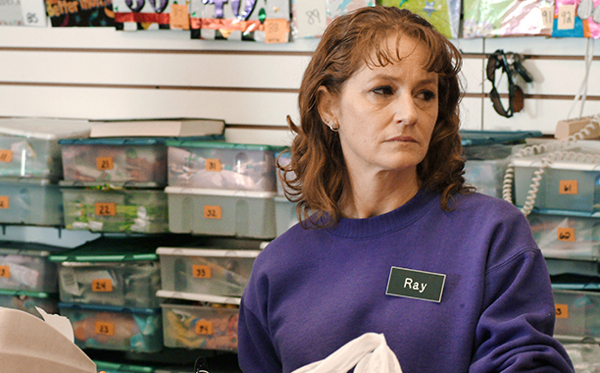Movie review by Greg Carlson
Winner of the Sundance Film Festival’s Grand Jury Prize, Courtney Hunt’s “Frozen River” is a taut, sober drama that uses the tension of human smuggling to comment more subtly on the challenges of single motherhood. Veteran actor Melissa Leo leaves a strong impression as Ray Eddy, the minimum wage-earning mom of fifteen-year-old T.J. (Charlie McDermott) and five-year-old Ricky (James Reilly). Ray ekes out a hand-to-mouth existence, and some days the boys’ only meal is microwave popcorn and Tang. Ray’s problems are exponentially exacerbated when her husband leaves with the cash that has been set aside for a new prefabricated home.
Through a series of chance encounters, Ray becomes involved in a small smuggling operation that transports illegal immigrants from Canada to the United States across the ice of the St. Lawrence River. Hunt directs the movie with little stylistic ornamentation, and her choices effectively serve the material. Unlike a few arguably derisive glances at the working class in “The Wrestler,” particularly the firefighter-obsessed party girl who seduces the protagonist, “Frozen River” pursues a social realist agenda in earnest.
In his almost shockingly condescending review in the San Francisco Chronicle, critic Mick LaSalle wondered rhetorically whether audiences would really want to “see a listless movie about a woman whose dream is to move into a double-wide trailer.” “Frozen River” is not listless – if anything it errs on the side of manufacturing dramatic tension in some of the smuggling sequences – and LaSalle should know that from “Norma Rae” to multiple films by John Sayles and Mike Leigh, escaping poverty is a dream shared by millions.
Undoubtedly, “Frozen River” succeeds on the combination of Hunt’s writing and Leo’s central performance – both of which have been nominated for Academy Awards. In so many ways, the movie presents the opposite of typical silver screen escapism, even though Hunt includes some expectation-defying sacrifices and choices that soften the impact of the story’s more complex depictions of race and class bias. Ray is not always easy to like, and her ignorance of others manifests in some disturbing and dangerous ways. Leo and Hunt both recognize the value of depicting Ray’s skepticism and fear with layers of complexity, which turns out to be one of the movie’s strongest dimensions.
Other than Leo, and indie regular Mark Boone Junior, “Frozen River” does not feature recognizable “names” in the roles, and some critics have griped about the lack of polish displayed by many of the supporting performers. Working at Leo’s skill level is no small task, though, and the supporting cast never fails to be wholly believable. Misty Upham, as Lila Littlewolf, is an ideal companion for Leo. Both women play characters victimized by depressed economic circumstances and the lack of a support system. They are also mothers who want to provide for their children, even if it means engaging in illegal activity to do so. “Frozen River” is an assured debut, but its shortcomings, especially the neat and tidy ending, keep it from brilliance. Hunt is a keen observer of nuance, however, and “Frozen River” takes an interest in a type of trafficking that remains mostly unknown to middle-class Americans.
